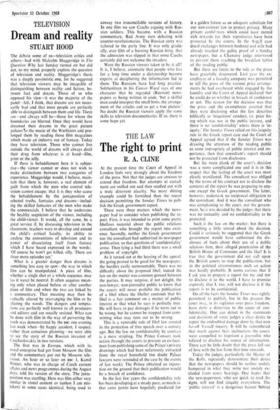Dream and reality
TELEVISION STUART HOOD
The debate some of us—television critics and others—had with Malcolm Muggeridge in The Question Why last Sunday turned on but did not, to my mind, properly explore the question of television and reality. Muggeridge's thesis was a deeply pessimistic one, for he suggested that television viewers may be incapable of distinguishing between reality and fiction, be- tween fact and dream. Those of us who opposed his view—it was the majority of the panel—felt, I think, that dreams are not neces- sarily bad and that most people are perfectly able to distinguish between them and life. There are—and always will be—those for whom the boundaries are blurred. Once they would have dreamed their dreams in the great picture palaces ¶o the music of the Wurlitzers and pro- longed them by reading those film magazines which made an industry out of fantasy. Today they have television. Those who cannot live outside the world of dreams will always distil their drug from whatever is at hand—film, print or the telly.
If there is befuddlement here it is subjec- tive—the viewer cannot or does not wish to make distinctions between two categories of experience. Muggeridge would, I believe, main- tain that -there is, however, a real element of guilt from which the men who control tele- vision cannot escape; that it is they who cause the befuddlement by the juxtaposition of selected truths, fantasies and dreams—includ- ing the skilled fantasies of the men who make the commercials. I believe that he underrates the healthy scepticism of the viewer, including the child-viewer. It would, all the same, be a great service if, by discussing television in the classroom, teachers were to develop and extend the child's critical faculty, its ability to analyse the conventions of television and its power of dissociating itself from fantasy which I have heard expressed in the words: 'Of course he won't get killed, silly. There are three more episodes yet.'
What is a greater danger than dreams is something less easy to spot—the way in which film can be manipulated. A piece of film, whether a single shot or a whole sequence, may (as it were) be neutral. It often acquires mean- ing only when placed before or after another piece of film and when the two are linked by a commentary. That meaning may then be radically altered by rearranging the film or by altering the words. The dangers and tempta- tions are perfectly well known to all producers and editors and are usually resisted. What can be done with film in the way of perverting the truth was demonstrated by the Bac one evening last week when—by happy accident, I suspect, rather than conscious planning—we were able to see the story of the Russian invasion of Czechoslovakia in two versions.
The first was in Europa, which with its usual enterprise had got from Moscow the film and the commentary put out by Moscow tele- vision. An hour or so later on BBC 1, Kamil Winter, who was in charge of Czech current affairs and news programmes during the August days, told his version of the story. The juxta- position was startling. Here was film either very similar hi visual content- or (unless I am mis- taken) in some cases identical, being used to
convey two irreconcilable versions of history. In one film we saw Czechs arguing with Rus- sian soldiers. This became, with a Russian commentary, Red Army men debating with counter-revolutionaries. The Russian story was tailored to the party line. It was only gradu- ally, over film of a burning Russian lorry, that the admission was slipped in that some Czechs certainly did not welcome the invaders.
Were the Russian viewers taken in by it all? It is, I believe, axiomatic that people who live for a long time under a dictatorship become experts at deciphering the information fed to them. The Russians have had long practice. Solzhenitsyn in his Cancer Ward says of one character that he regarded (Russian) news- papers as being written in code, 'but a skilful man could interpret the small hints, the arrange- ment of the articles and so get a true picture.' No doubt the Russian viewers apply the same skills to television documentaries. If so, there is some hope yet.






































 Previous page
Previous page